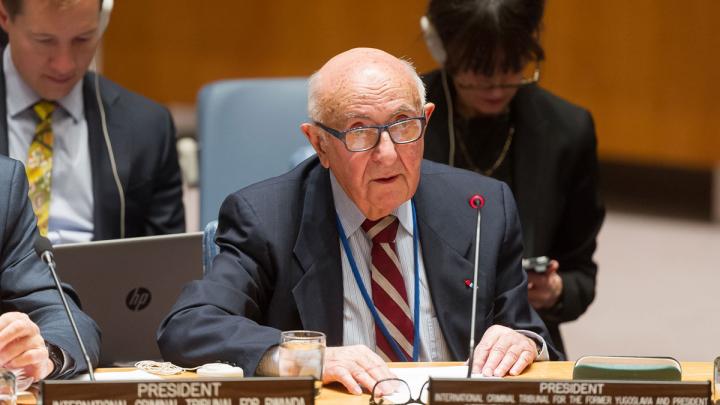President Meron addresses the UN Security Council
Today, the President of the Mechanism for International Criminal Tribunals (MICT), Judge Theodor Meron, updated the United Nations Security Council on the work and progress of the Mechanism in the past six months.
President Meron informed the Security Council about the Mechanism’s judicial work, including the first appeal judgement of the Mechanism, in the Ngirabatware case, which was delivered in December 2014 without delays. President Meron noted that the Chambers has established rosters and procedures that will allow the Mechanism to efficiently adjudicate upcoming trial or appeal work. In addition, he referred to the recently adopted code of judicial conduct as a tangible demonstration of the Mechanism Judges’ commitment to the highest ethical standards.
The President also noted the substantial progress in assuming responsibility for a variety of functions of the ICTR and ICTY, including through the creation of a self-standing administration, the signing of a host state agreement with the Netherlands, the continuation of the transfer of ICTR and ICTY archives into the Mechanism’s custody and the strengthening of the monitoring of cases referred to national jurisdictions. Furthermore, the President indicated that the construction of the new Arusha building was continuing on schedule and that it was planned to be completed in the new year.
President Meron then turned his attention to two key challenges that continue to face the Mechanism. He first voiced his concern about the outstanding arrest warrants for the remaining ICTR indictees who are yet to be apprehended, including three who are expected to be tried by the Mechanism. In this regard, the President stated that “[i]t is imperative that all members of the international community continue and, indeed, increase their efforts to apprehend the remaining ICTR fugitives, and the Council’s leadership in this regard remains essential”.
The President then referred to the challenge facing the Mechanism posed by persons acquitted by the ICTR or who have completed the sentences imposed by that Tribunal. The President emphasised that the Mechanism continues to rely on the efforts of the international community to provide opportunities for relocation, underlining that resettlement of these individuals is “…a fundamental responsibility and humanitarian imperative...”.
In closing, the President thanked the ICTR, the ICTY, the UN Office of Legal Affairs and other UN agencies and national governments for their continued support. He underscored that the Mechanism serves as an example of best practices in international criminal justice and, through its work, supports “…the strengthening of the rule of law on the international level and around the world”.

Today, the President of the Mechanism for International Criminal Tribunals (MICT), Judge Theodor Meron, updated the United Nations Security Council on the work and progress of the Mechanism in the past six months.
President Meron informed the Security Council about the Mechanism’s judicial work, including the first appeal judgement of the Mechanism, in the Ngirabatware case, which was delivered in December 2014 without delays. President Meron noted that the Chambers has established rosters and procedures that will allow the Mechanism to efficiently adjudicate upcoming trial or appeal work. In addition, he referred to the recently adopted code of judicial conduct as a tangible demonstration of the Mechanism Judges’ commitment to the highest ethical standards.
The President also noted the substantial progress in assuming responsibility for a variety of functions of the ICTR and ICTY, including through the creation of a self-standing administration, the signing of a host state agreement with the Netherlands, the continuation of the transfer of ICTR and ICTY archives into the Mechanism’s custody and the strengthening of the monitoring of cases referred to national jurisdictions. Furthermore, the President indicated that the construction of the new Arusha building was continuing on schedule and that it was planned to be completed in the new year.
President Meron then turned his attention to two key challenges that continue to face the Mechanism. He first voiced his concern about the outstanding arrest warrants for the remaining ICTR indictees who are yet to be apprehended, including three who are expected to be tried by the Mechanism. In this regard, the President stated that “[i]t is imperative that all members of the international community continue and, indeed, increase their efforts to apprehend the remaining ICTR fugitives, and the Council’s leadership in this regard remains essential”.
The President then referred to the challenge facing the Mechanism posed by persons acquitted by the ICTR or who have completed the sentences imposed by that Tribunal. The President emphasised that the Mechanism continues to rely on the efforts of the international community to provide opportunities for relocation, underlining that resettlement of these individuals is “…a fundamental responsibility and humanitarian imperative...”.
In closing, the President thanked the ICTR, the ICTY, the UN Office of Legal Affairs and other UN agencies and national governments for their continued support. He underscored that the Mechanism serves as an example of best practices in international criminal justice and, through its work, supports “…the strengthening of the rule of law on the international level and around the world”.